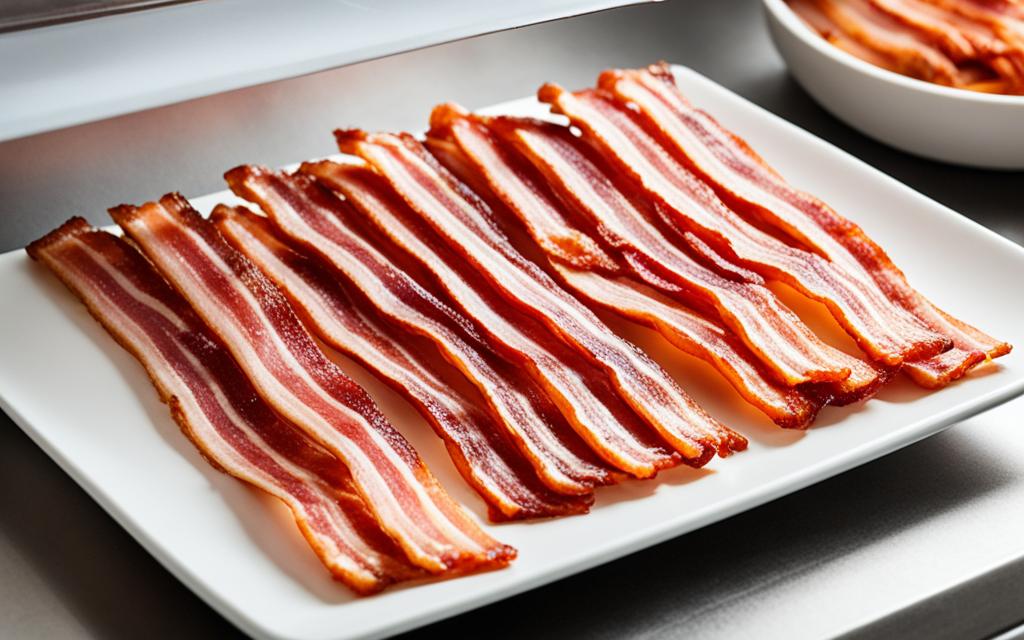Bacon is a staple in many households, but it’s important to know how long it can last in the fridge to ensure food safety and quality. This article will provide you with information on the typical shelf life of bacon, offer tips for proper storage, and help you identify when bacon has gone bad.
Understanding Bacon’s Shelf Life
The shelf life of bacon is influenced by several key factors, including the type of bacon, the way it is packaged, and the storage conditions. Generally, uncooked bacon can last between 1-2 weeks when stored properly in the refrigerator, while cooked bacon typically has a shorter shelf life of 3-4 days.
Temperature, humidity, and air exposure play a crucial role in determining how long bacon remains fresh. Proper storage techniques, such as keeping unopened bacon in its original packaging and placing it on the bottom shelf of the refrigerator, can help extend its lifespan. Once opened, bacon should be tightly wrapped in plastic or foil to prevent air exposure.
For longer-term storage, bacon can be frozen for up to 3 months. When freezing, it’s important to use airtight packaging or resealable plastic bags to prevent freezer burn and maintain the quality and freshness of the bacon.
How Long Does Bacon Keep in the Fridge?
Uncooked, unopened bacon typically lasts 1-2 weeks in the refrigerator when stored properly. Once opened, the shelf life decreases to 5-7 days. Cooked bacon, on the other hand, has a shorter shelf life of 3-4 days in the refrigerator. It’s important to note that these timeframes are approximate and may vary depending on the specific storage conditions and the quality of the bacon.
To ensure the freshness and safety of your bacon, it’s crucial to pay attention to the package’s “use by” or “best by” date. Additionally, keep a close eye on the appearance, smell, and texture of the bacon to determine if it has spoiled. If the bacon appears discolored, slimy, or has an off-putting odor, it’s best to discard it.
| Bacon Type | Refrigerator Shelf Life |
|---|---|
| Uncooked, Unopened | 1-2 weeks |
| Uncooked, Opened | 5-7 days |
| Cooked | 3-4 days |
Remember, the shelf life of bacon can be influenced by a variety of factors, including the storage temperature, humidity, and air exposure. By following these guidelines and inspecting your bacon before consumption, you can enjoy fresh, delicious bacon while minimizing the risk of foodborne illness.
Proper Storage Techniques for Bacon
To maximize the shelf life of your bacon, it’s crucial to store it properly. For refrigerator storage, keep unopened bacon in its original packaging and place it on the bottom shelf, where the temperature is coldest. Once opened, wrap the bacon tightly in plastic wrap or aluminum foil to prevent air exposure, which can cause it to spoil more quickly.
For longer-term storage, you can freeze your bacon for up to 3 months. When freezing, be sure to wrap the bacon in airtight packaging or place it in a resealable plastic bag to prevent freezer burn and preserve its freshness.
By following these simple storage techniques, you can enjoy your bacon at its best and avoid the risk of foodborne illness. Remember, proper storage is key to ensuring your bacon stays fresh and safe to consume.
Signs That Bacon Has Gone Bad
When it comes to ensuring the safety and quality of your bacon, it’s crucial to be able to identify the signs that it has spoiled. Visual cues are often the first indication that your bacon has gone bad. Look for discoloration, such as a greenish or grayish hue, as well as the presence of slime or mold on the surface. These are clear indications that the bacon has been compromised and should not be consumed.
In addition to visual clues, the smell and texture of the bacon can also reveal if it has passed its prime. If the bacon has an off or sour odor, or if it feels slimy, sticky, or unusually dry, it’s best to discard it. These textural and olfactory changes are telltale signs that the bacon has begun to deteriorate and is no longer safe to eat.
If you’re ever unsure whether your bacon is still good, it’s always better to err on the side of caution. When in doubt, throw it out. Food safety should be your top priority when it comes to handling and consuming perishable items like bacon. By being vigilant and paying attention to these visual, olfactory, and textural cues, you can ensure that you only enjoy fresh, delicious bacon that is free from any risk of foodborne illness.
Conclusion
In conclusion, understanding the shelf life of bacon and proper storage techniques can help ensure that you enjoy fresh, delicious bacon every time. By following the guidelines outlined in this article, you can maximize the lifespan of your bacon and avoid the risk of foodborne illness.
Remember to always inspect your bacon before consumption and trust your senses if it appears or smells off. Visual cues like discoloration, slime, or mold, as well as an off or sour smell, are all signs that the bacon has spoiled. If you’re ever unsure, it’s best to err on the side of caution and discard the bacon.
With these tips, you’ll be able to safely store and enjoy your bacon for as long as possible. Whether you’re stocking up on your favorite breakfast staple or preparing a delicious dish, understanding how to properly store and identify fresh bacon will help you make the most of your purchase and ensure your meals are as flavorful and safe as possible.










